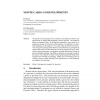Free Online Productivity Tools
i2Speak
i2Symbol
i2OCR
iTex2Img
iWeb2Print
iWeb2Shot
i2Type
iPdf2Split
iPdf2Merge
i2Bopomofo
i2Arabic
i2Style
i2Image
i2PDF
iLatex2Rtf
Sci2ools
101
Voted
ACG
2003
Springer
2003
Springer
Monte-Carlo Go Developments
We describe two Go programs, ¢¡¤£¦¥ and ¢¡¤§¨£ , developed by a Monte-Carlo approach that is simpler than Bruegmann’s (1993) approach. Our method is based on Abramson (1990). We performed experiments to assess ideas on (1) progressive pruning, (2) all moves as first heuristic, (3) temperature, (4) simulated annealing, and (5) depth-two tree search within the Monte-Carlo framework. Progressive pruning and the all moves as first heuristic are good speed-up enhancements that do not deteriorate the level of the program too much. Then, using a constant temperature is an adequate and simple heuristic that is about as good as simulated annealing. The depth-two heuristic gives deceptive results at the moment. The results of our Monte-Carlo programs against knowledge-based programs on 9x9 boards are promising. Finally, the ever-increasing power of computers lead us to think that Monte-Carlo approaches are worth considering for computer Go in the future.
Related Content
| Added | 06 Jul 2010 |
| Updated | 06 Jul 2010 |
| Type | Conference |
| Year | 2003 |
| Where | ACG |
| Authors | Bruno Bouzy, Bernard Helmstetter |
Comments (0)

